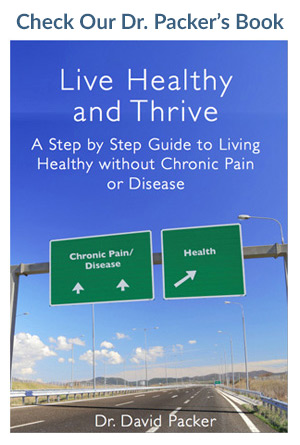 Backpacks are a staple for school, work, and travel. If you’re like most people, you probably have bought many backpacks over the years, either for yourself or for children. However, spinal health is a major concern that many people overlook when it comes time to choose a backpack for themselves or a loved one.
Backpacks are a staple for school, work, and travel. If you’re like most people, you probably have bought many backpacks over the years, either for yourself or for children. However, spinal health is a major concern that many people overlook when it comes time to choose a backpack for themselves or a loved one.
As a spine management physician and chiropractor in the Chesapeake region of Virginia for more than 20 years, I have helped many patients choose a good backpack for their spine. In this article, I will show you what to consider when it comes time to buy your next backpack for yourself or a family member.
How A Heavy Backpack Affects The Spine
Many people, including children, have spine issues due to heavy, ill-fitting backpacks. Studies have shown that poor backpack choices can impact the spine in various ways, including:
- Compressing the vertebral discs in your spine. These discs cushion the vertebrae, but can get injured, leading to bulging discs and herniation.
- Forcing an abnormal spine curvature. Poor backpack choices can interfere with your spinal biomechanics and force your spine to curve in a way that puts additional stress on your back. This can be painful and can worsen conditions like scoliosis.
Top Factors To Consider When Choosing a Backpack
Many things are important to consider when choosing a safe, ergonomic backpack. These include:
- The backpack’s weight: Modern technology has allowed the production of lightweight backpacks. A backpack no longer needs to be heavy to be sturdy. Choosing a backpack without leather or metal decorations will help keep it lightweight.
- The backpack’s size: Choose the smallest-sized backpack to meet your needs. A large backpack can increase the temptation to fill it with items, making it heavier.
- The backpack’s width: The backpack should be no wider than the wearer’s torso
- The backpack’s length: The backpack should hang no more than 4 inches below the wearer’s waist. Ideally, the bottom of the backpack should be no lower than the waist.
- Wide shoulder straps: The wider the shoulder strap, the more even the distribution over both shoulders.
- Padded back: A padded back with a groove down the center for the spine can make a backpack more comfortable to wear.
- Chest and waist straps: More common on hiking packs, chest straps help to hold the shoulder straps in towards the chest and prevent you from carrying too much weight on your shoulders. Similarly, a waist strap helps you to keep your load centered.
- Consider a rolling backpack: Backpacks have evolved over the years, and some come both with backpack straps as well as wheels. Although not appropriate for hiking, a rolling backpack can help ease the strain on your back if you use it for school, work, or travel. They are generally small enough to fit under an airline seat, making them a good carry-on option for airlines.
- Test multiple backpacks for a good fit: Try on different backpacks to make sure that they fit correctly before you buy them. Some outdoor-supply stores will even have sample weights so you can see how it would feel fully packed.
How To Properly Wear a Backpack
After you buy your backpack, it is important to optimize your back health by wearing it correctly:
- Use both shoulder straps: Instead of carrying your backpack on just one shoulder, using both straps allows the backpack’s weight to be evenly distributed. This can help your posture, which helps you avoid back pain.
- Tighten the bottom straps when you put the backpack on: When you tighten the bottom straps of the backpack, the weight of the pack is pulled towards your center of gravity, easing the overall strain on your back and making the load feel lighter. You can loosen the straps before you remove the backpack.
- Weigh the backpack before you wear it: A backpack should weigh no more than 15% of your total body weight. This is especially important if you are choosing a backpack for a child.
- Pack the heaviest items closest to the body: Keeping the heaviest items near your back will reduce the strain, since the weight is close to your center of gravity.
Choosing the Best Backpack At Precision Spinal Care
As a certified NUCCA chiropractor and spine management physician, I make sure to fully evaluate your back health before coming up with a treatment plan. If you need help determining whether a backpack is healthy for your back, I am happy to take a look at this during your appointment.
To accomplish this, during your first visit, I will do a thorough examination of your spine. Afterwards, I will go over my evaluation with you in detail. Together, we will set reasonable expectations and milestones for recovery and further evaluation. We will also put together a treatment plan that meets your care needs. I will reevaluate you to make sure you are meeting your goals.
My experience and expertise in spinal biomechanics allow me to competently and safely address your back issues, including those related to poor using supplies like backpacks. I am a trauma and hospital-qualified spine management physician. I have credentials in MRI spine interpretation, spinal biomechanical engineering, and orthopedic testing through the Academy of Chiropractic. I am also a fellow in Spinal Biomechanics and Trauma which is recognized through the SUNY Buffalo Jacobs School of Medicine.
If we determine that chiropractic is not the best solution for your needs, I will recommend the type of specialist who is most appropriate for you. I may also recommend other specialists that can be used in conjunction with chiropractic care to help you meet your needs.
We understand that you need to explore all your options when you are trying to treat your pain. At Precision Spinal Care, we are happy to help you determine the best way to address your specific needs and discuss all the options with you and your family.
Call our office at (757) 382-5555 to speak to the doctor or set up a consultation. You can also set up an appointment online here.

